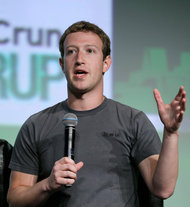 Eric Risberg/Associated PressMark Zuckerberg at the TechCrunch conference Tuesday.
Eric Risberg/Associated PressMark Zuckerberg at the TechCrunch conference Tuesday.
SAN FRANCISCO — Mark Zuckerberg spoke to a hometown crowd here Tuesday afternoon, acknowledging his company’s “disappointing” performance on Wall Street, hinting at new moneymaking strategies, and casting his company as one that continued to build new things in the face of criticism.
“I would rather be in the cycle where people underestimate us,” he said at an annual conference sponsored by TechCrunch, the technology blog.
It was Mr. Zuckerberg’s first public appearance since Facebook made its debut on Wall Street in May, only to see its stock price fall fast and hard. But his remarks seemed to have a positive effect; immediately after he spoke, Facebook shares rose about 3 percent in after-hours trading.
Still, Facebook shares are now worth roughly half of the public offering price, and Mr. Zuckerberg, the company’s chief executive and co-founder, is under intense pressure to restore its credibility among investors, a problem he acknowledged.
“The performance of the stock has obviously been disappointing,” he said at the conference. “We care about our shareholders.”
In a jocular, half-hour question-and-answer session with the blogger-turned-investor Michael Arrington, Mr. Zuckerberg — talking at top speed and dressed in his usual gray T-shirt and jeans — dropped a few hints about Facebook’s plans, and said that the site was handling up to a billion search queries by users every day.
Search is Google’s principal advantage, but Mr. Zuckerberg said a team of engineers within Facebook was working on improving Facebook’s search tool to vet, for instance, restaurant recommendations from friends. “At some point we’ll do it,” he said.
He sought to cast Facebook as a company with a promising future on mobile phones — and himself as an entrepreneur who did not entirely eschew moneymaking.
“Building a mission and building a business goes hand in hand,” he said. “We are about doing both.”
When Facebook announced its bid to go public earlier this year, Mr. Zuckerberg famously declared in a letter to would-be investors that his company’s mission was not just to make money for its own sake. At the conference he said he had composed that letter on his mobile device. “I do everything on my phone,” he said.
But he said the company was not making its own phone.
Facebook came out of the box last May with an extraordinary valuation of over $100 billion. Among investors, expectations ran extraordinarily high that Facebook would accelerate profits. That didn’t happen.
Revenue grew, but not as explosively as before the I.P.O. Wall Street worried about Facebook’s ability to make money on the mobile platform, because its users were increasingly logging in on their phones and tablets. And its social gaming partner, Zynga, posted dismal results this summer, which hurt Facebook’s own stock.
Even as he sought to assuage Wall Street, he used Tuesday’s public appearance to appeal to the coders in the conference crowd, saying now is a “great time” to work at Facebook. New employees, he suggested, would be rewarded with more shares, as a way to compensate for the low price of those shares.
Some analysts think Facebook’s stock could fall more. The investment firm Stifel suggested in August that Facebook might be worth buying at $16.
Mr. Zuckerberg said he thought the company should be judged on its lasting impact, not just its stock price.
“Ten, 20 years from now, the legacy of this company should be, we have connected everyone in the world,” he said. “That’s a lot.”
Article source: http://bits.blogs.nytimes.com/2012/09/11/zuckerberg-acknowledges-disappointing-wall-street/?partner=rss&emc=rss